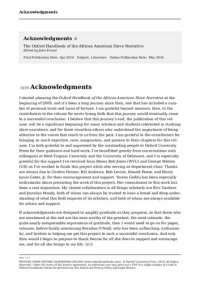
Ebook: The Oxford Handbook of the African American Slave Narrative
Author: John Ernest (editor)
- Tags: slave narratives slave testimony African American History Works Progress Administration plantations gender sexuality ecocriticism transatlantic studies hemispheric studies
- Series: (Oxford Handbooks)
- Year: 2014
- Publisher: Oxford University Press
- Edition: Illustrated
- Language: English
- pdf
The Oxford Handbook of the African American Slave Narrative approaches the history of slave testimony in three ways: by prioritizing the broad tradition over individual authors; by representing interdisciplinary approaches to slave narratives; and by highlighting emerging scholarship on slave narratives, concerning both established debates over concerns of authorship and agency, for example, and developing concerns like ecocritical readings of slave narratives. Ultimately, the aim of the Handbook is not to highlight the singularity of any particular account, nor to comfortably locate slave narratives in traditional literary or cultural history, but rather to faithfully represent a body of writing and testimony that was designed to speak for the many, to represent the unspeakable, and to account for the experience of enslaved and nominally free communities. The Handbook is organized into six sections: “Historical Fractures,” “Layered Testimonies,” “Textual Bindings,” “Experience and Authority,” “Environments and Migrations,” and “Echoes and Traces.” The Handbook’s contributing scholars address testimony from a broad range of sources, including traditional archives, Works Progress Administration (WPA), newspapers, diaries or memoirs, pension records, and even the testimony suggested by traces in the landscape and architecture of slave plantations. The reach of sources covered in the Handbook is not exhaustive, but instead is intended to indicate the broad range of sources from which testimony can be recovered. Other chapters address matters of gender, sexuality, and community, environmental concerns, legal contexts and implications, and manifestations of slave testimony in visual and aural cultures. Many essays work to locate African American slave narratives both historically and geographically, through considerations of literary history, through considerations of the geography covered by slave narratives, and through hemispheric and transatlantic connections central to understanding U.S. testimony. There are no chapters devoted to major writers, since various resources already exist for that purpose and since those writers emerge as central figures in many of the essays. The purpose of all chapters in the Handbook is to account for the conventional wisdom on the subject in the process of exploring critical new directions for approaching these concerns. The Handbook’s goal is to encourage research on a great number of understudied narratives while demonstrating the rich complexity of this field of study for those just entering it.
Download the book The Oxford Handbook of the African American Slave Narrative for free or read online
Continue reading on any device:

Last viewed books
Related books
{related-news}
Comments (0)